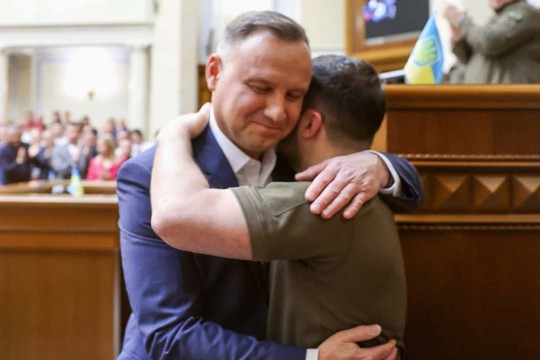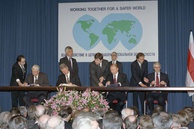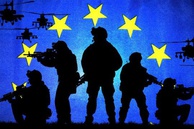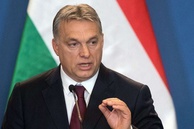Polish President Duda and Zelensky – hypocritical embraces.
Photo: PAP
The latest spat between Warsaw and Kyiv is predictable and merely confirms the known truth: history repeats itself. A recent survey conducted by the United Surveys sociological service at the request of the Wirtualna Polska online portal reveals Polish public opinion on relations with Ukraine.[i] According to the survey, 61.3% of Poles believe that relations between Warsaw and Kyiv have worsened in 2024, 7.9% believe they have improved, 21.9% claim that relations between the two countries remain the same, and 8.9% of respondents were undecided.
What has cast a shadow over the relationship between these allies, who became so close thanks to by their current shared hatred of Russia? Ukraine has stopped considering Poland as one of its key partners in the context of the conflict with Russia, as Warsaw is no longer able to provide Kyiv with the same level of military assistance, President Andrzej Duda said on Radio Zet.[ii] According to Duda, Volodymyr Zelensky is under pressure from his main donors whose stance significantly influences his decisions. Warsaw must take this into account, as "life is cruel," the president summed up. Following his philosophical reflections, Duda moved on to the specifics: Poland will not be able to transfer MiG-29 fighter jets to Ukraine, as both sides agreed in July, without obtaining guarantees from NATO for the protection of Polish airspace and until Warsaw receives more modern aircraft it has purchased from the West.
Then, the Polish Foreign Minister, Radosław Sikorski, and the Minister of Defense, Władysław Kosiniak-Kamysz, joined in.[iii]
- Sikorski stated that Warsaw's capabilities are limited. "Ukraine has nearly 300 Polish tanks, a lot of heavy equipment, including aircraft, but we are also a frontline state...," said Sikorski. Warsaw itself needs the MiG-29 fighter jets that Kyiv is demanding, he said. [iv]
- Kosiniak-Kamysz indicated the priority of Poland's defense capabilities over helping Kyiv: "Poland has transferred as much military equipment to Ukraine as possible, but the limit [for assistance] is Poland's defense capability and security," wrote Kosiniak-Kamysz on the social network X (banned in Russia). He explained Warsaw's refusal to intercept missiles over Ukraine by the lack of agreement from NATO. "The decision to shoot down missiles is always a response from NATO as a whole, not one country. There is no such decision from the alliance today," he emphasized.
Next, Sikorski announced that Poland is offering Ukraine the opportunity to purchase weapons from them on credit. According to him, the government of Donald Tusk "has made a proposal for a defense credit": "Here you go, please buy from Polish factories on credit, and when you recover, you can pay." [v]
Poland's position is quite understandable from both a political and economic perspective. The total assistance provided by Warsaw to Kyiv since the beginning of the military conflict in Ukraine amounted to 3.3% of the country's GDP, or 100 billion zlotys ($26 billion). Therefore, Sikorski's statements should be seen as an attempt to pressure both the West and Ukraine.
The bluntness of Sikorski’s statements about Ukraine is easily explained: "the presidential elections are just around the corner, and Sikorski is one of the two main contenders for the post from the ruling coalition. So far, he is seriously losing to the main candidate, Warsaw Mayor Rafał Trzaskowski, who lost to Andrzej Duda by only 2% four years ago. And so, the minister is trying to "jump out of his skin" to prove his special patriotic stance and play up to the sentiments of the electorate, who are demonstrating more and more dissatisfaction over the unrestrained aid to Ukraine." [vi]
The current tension between Kyiv and Warsaw is driven by both internal and external factors for each country. Poland's internal political maneuvering ahead of elections necessitates raising the issue of the Volyn Massacre, which leads to problems in relations with the Ukrainian regime. Economic concerns compel Poland to discuss a military loan for Ukraine, as the Polish economy is dependent on US and EU subsidies. The plan to turn Poland into a key US ally in Europe and an LNG hub for the Old World has yet to be fulfilled. The final straw for Polish irritation was Zelensky's "Victory Plan," which Polish observers believe overlooks Poland and its interests. Zelensky's plan envisions ending the war "no later than" 2025, "immediate NATO membership," "continued Western support, including arming the Ukrainian army, supporting the ability to use Western weapons to attack military facilities in Russia, and expanding intelligence data sharing" with Kyiv. The West and Ukraine must begin strategic deterrence of Russia.
The Polish press highlights overt discontent of the Polish society, which sees in Zelensky's "Victory Plan" a desire by the Kyiv regime to shift the burden of a potential "big war," with the prospect of a world war involving nuclear strikes, onto Western countries. "Kyiv is ready to pay for this by transferring Ukrainian natural resources to countries like the US, Germany, Britain, France, and Italy. Zelensky, according to one Polish commentator, believes that, having their own interests in Ukraine, these countries "will be ready to participate in the war (indirectly) until the end, and give guarantees later." But he "overestimates the value of his assets." In doing so, Zelensky sidelines Central and Eastern Europe and the Baltics, where they supported Kyiv even "without a bribe in the form of resource deposits." [vii]
What is important is that these "five points of Zelensky" contradict Poland's national interests, as Polish companies will not be awarded contracts for the reconstruction of the Ukrainian economy. They will be intercepted by the Western countries mentioned by Zelensky. Finally, Poles also sense a potential threat to their military-political interests: "After Ukraine joins NATO (which contradicts the goals of the SMO - author), the Americans will withdraw their contingent from Poland and replace it with Ukrainian troops, depriving Warsaw of Washington's political patronage. Having joined the EU (if this ever happens - author), such Ukraine will also draw the attention of Brussels on the eastern borders of the European Union. At Poland's expense, it will be given priority funding to upgrade its standards up to the common European ones. At the same time, Ukraine will continue to be a "geopolitical mine." Its political class and, to some extent, society are focused on revenge and territorial claims, now - towards Russia, but what next? As recently as September of this year, the Ukrainian Foreign Ministry had to apologize for the words of then Foreign Minister Dmytro Kuleba, stating that he did not make territorial claims against the neighboring country in his reflections on "Ukrainian territories" in Poland..." [viii]
In short, many of the problems in relations between Kyiv and Warsaw are based not on time-serving political speculation, but on deep historical, economic, and political contradictions.
When Polish President Duda states that "Ukraine has ceased to consider Polish interests in the context of the conflict with Russia," he is saying that Ukraine, through its representatives, is beginning to "switch national interests." For the Polish-Lithuanian Commonwealth, the lands of Ukraine were the "Eastern Borderlands," a necessary part of achieving its political goal – the Commonwealth "from sea to sea." For the Third Reich, Ukraine was a land rich in human and other resources necessary for its prosperity. The Reich was destroyed, and Poland, most likely, has nothing against becoming a country "from sea to sea," or at least regaining the "Eastern Borderlands."
Neither the Reich nor Poland needs Ukraine with its "national interests." Ukrainian nationalists harbored the illusion that by using the Nazi regime, they could create an "independent Ukraine," but the Reich only needed them as tools and collaborators. It’s the very role they are useful to Warsaw today, as it is reminding them of their place - remembering historical controversies (the Volyn Massacre), which the Ukrainian nationalists cannot resolve – if they chose to do so, they would have to admit their guilt in the mass killings.
Interestingly, Warsaw doesn't go beyond rhetoric in its demands, it is not nailing Zelensky's regime down. The reason for this is that if it chose to do so, the current architecture of Ukraine, which is fighting for "independence and democracy" the Western way, would fall apart, as the crimes of Ukrainian nationalists during World War II would come to light. And the West doesn't want that. Not at all. Its confrontation with Russia while using Ukraine as a weapon would instantly lose its "fighting evil" facade.
The historical aspect of the Polish-Ukrainian conflict is deeply rooted in the public consciousness of both countries, as noted for Western readers by British anthropologist Chris Hann from the Max Planck Institute for Social Anthropology in Germany. He underscores that the persistent cause of disagreement between the two states lies in "the different interpretations of the violence that took place during and after World War II. Ukrainian ministers have a non-diplomatic habit of pointing out that significant territories of modern Poland were previously occupied by Ukrainians. According to historical, ethnolinguistic and religious criteria which are usually considered central to the formation of nations, Ukraine can indeed claim parts of the Polish Carpathians to a greater extent than Crimea or Donbas," Hann emphasizes. [ix]
Therefore, the current problems in the relationship - the supply of aircraft, Ukrainian participation in the Polish economy, the issue of Ukrainian conscripts staying on the Polish territory, Polish air defense participation in repelling missiles over Ukraine – these are all but time-serving political games which result from much more serious historical and geopolitical disagreements, "arisen from the ashes" against the backdrop of existential questions of our time.
The opinion of the author may not reflect the position of the Editorial
[i] https://www.ng.ru/news/804341.html
[ii] https://tass.ru/mezhdunarodnaya-panorama/22257595
[iii] https://www.ng.ru/news/804310.html
[iv] https://ukraina.ru/20241101/1058554014.html
[v] https://ria.ru/20241101/polsha-1981443041.html
[vi] https://t.me/c/1686844692/6816
[vii] https://t.me/stremidlowsky/4432
[viii] https://t.me/stremidlowsky/4432
[ix] https://t.me/pl_syrenka/9772
read more in our Telegram-channel https://t.me/The_International_Affairs

 8:52 09.11.2024 •
8:52 09.11.2024 •



























